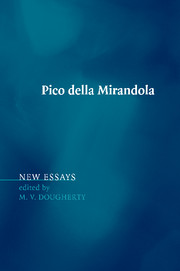Book contents
- Frontmatter
- Contents
- List of Contributors
- Pico della Mirandola
- 1 Introduction
- 2 Pico on the Relationship of Rhetoric and Philosophy
- 3 Pico, Theology, and the Church
- 4 Pico della Mirandola's Philosophy of Religion
- 5 The Birth Day of Venus: Pico as Platonic Exegete in the Commento and the Heptaplus
- 6 Three Precursors to Pico della Mirandola's Roman Disputation and the Question of Human Nature in the Oratio
- 7 Pico on Magic and Astrology
- 8 Pico's Quest for All Knowledge
- 9 A Life in Works
- Index
7 - Pico on Magic and Astrology
Published online by Cambridge University Press: 08 February 2010
- Frontmatter
- Contents
- List of Contributors
- Pico della Mirandola
- 1 Introduction
- 2 Pico on the Relationship of Rhetoric and Philosophy
- 3 Pico, Theology, and the Church
- 4 Pico della Mirandola's Philosophy of Religion
- 5 The Birth Day of Venus: Pico as Platonic Exegete in the Commento and the Heptaplus
- 6 Three Precursors to Pico della Mirandola's Roman Disputation and the Question of Human Nature in the Oratio
- 7 Pico on Magic and Astrology
- 8 Pico's Quest for All Knowledge
- 9 A Life in Works
- Index
Summary
Pico studied philosophy at Ferrara, Padua, and Paris. At all three universities he would have been exposed to ideas about magic and astrology, which were both mainstream subjects in natural philosophy. Astrology studied the effects of the motions of the heavenly bodies; magic sought to manipulate nature; astral magic combined the two. Pico also would have learned about them through his humanist pursuits. In his earlier writings, Pico's acceptance of magic is clear; his acceptance of astrology is also discernible. Pico had a solid theoretical knowledge of both subjects, but he was not a practitioner of either.
Astronomy and astrology were taught in three curricula in the universities that Pico attended: mathematics, philosophy, and medicine. Astrology was part of the Aristotelian worldview of the universities. Although Aristotle had not written about astrology, he did suggest that an immutable, immaterial heaven affected all existence. Ptolemy not only wrote the authoritative textbook of astronomy, the Almagest, but he also wrote the major textbook of astrology, the Tetrabiblos. However, for him these were not separate subjects; rather they were the two sides of the study of the heavens, the theoretical and the practical. Isidore of Seville, in the seventh century, first gave them the names “astronomy” and “astrology,” but those words were often interchangeable in the medieval and Renaissance periods.
Unlike astrology, magic as an intellectual pursuit was not part of the curriculum at the universities. It was, however, often studied in relationship to subjects in philosophy and medicine.
- Type
- Chapter
- Information
- Pico della MirandolaNew Essays, pp. 152 - 178Publisher: Cambridge University PressPrint publication year: 2007



